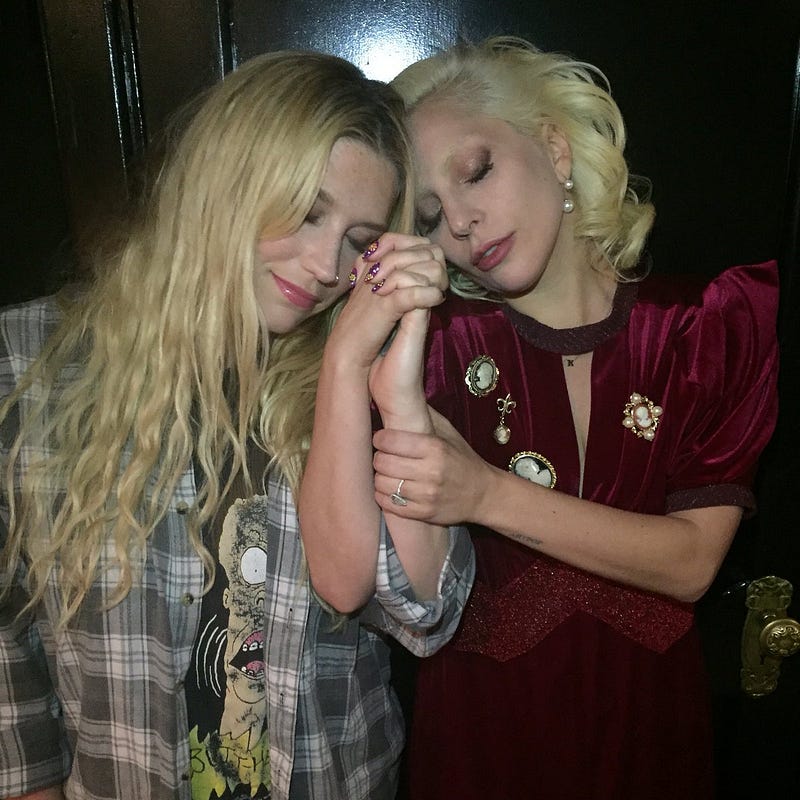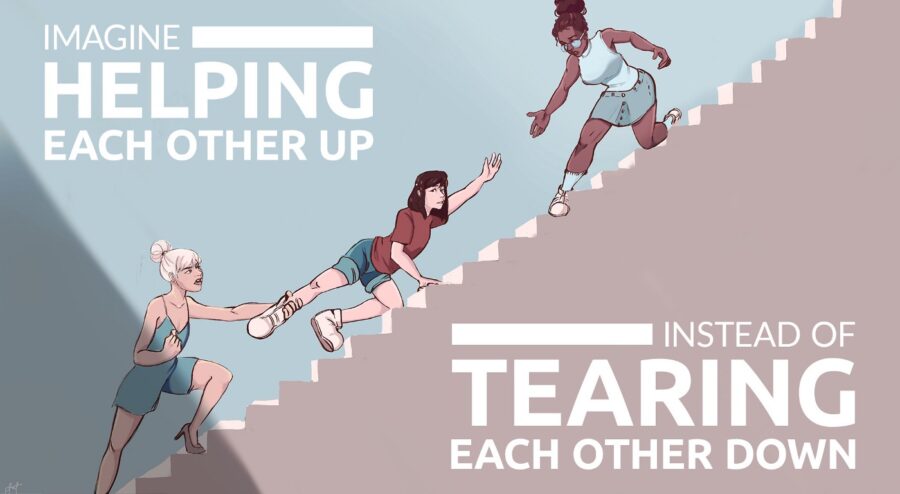Imagine Helping Each Other Up Instead of Tearing Each Other Down
How Self-Destructive Behavior is Hindering Women’s Progress
To my mother, my sister, my grandmothers. To my female best friends and colleagues. To my feminist sisters who continue to break through the barriers of our strict patriarchal society by excelling in their respective crafts and working toward equality. To the single moms who go to college to receive an education and work to support their children, while fighting the typical societal stereotypes. To the women of color who embrace themselves and their heritage. You make me proud to be a woman.
In Lord Alfred Tennyson’s poem, “Ulysses,” he writes, “I am a part of all that I have met,” and I have met some beautiful, strong and independent women that have helped shaped the person I am today. I am inspired by the hard-working women I see every day, but I’m also surrounded by a constant cloud of negativity that is the hate women get — from men, from society, but mostly from each other.
Feminism and sexism are terms that have recently become buzzwords in our generation’s battle for feminist change; easily thrown around without meaning and ultimately unclear. Men, women, and media have redefined these words in order to fit their arguments rather than to use them when appropriate. For this reason, it is necessary to remind ourselves of what these buzzwords actually are and more importantly, what they are not.
First off, feminism is not our enemy. It is not growing out your body hair to make narrow-minded people feel uncomfortable. It is not “freeing the nipple” just to get a reaction out of the public. It is not a trendy hashtag to get attention on social media. Feminism is not man-hating or the notion that the only way for women to succeed is to tear men down.
What feminism is, is the advocacy of women’s rights on the grounds of political, social, and economic equality to men.
Secondly, sexism isn’t just women being subjected to cat-calls, the wage-gap, or the blatant sexual objectification we have grown used to. Benevolent sexism, the belief that women need to be handled carefully, is just as prominent and possibly, even more harmful. Under the umbrella of benevolent sexism falls ideas that have secretly hindered the progress of women for centuries: Women should not be burdened by heavy lifting, dirty or unpleasant jobs, or complex ideas.
Age-old sexism has been insidiously hidden under the guise of chivalry and romance, two of women’s most beloved notions.
It goes back to the “Cult of True Womanhood” of the 1800s that encouraged women to embrace piety, purity, submissiveness and domesticity. It was the cultural idea that women were to be placed on a pedestal that restricted them from exploring ideas outside of what was seen as strictly “feminine.”
Chara Powell, full-time professor of psychology at Mt. San Antonio College and marriage and family therapist, believes women are too often viewed as weaker, more delicate and less suited for difficult professions. According to Powell, benevolent sexism is more dangerous than its obvious counterpart, in that it normalizes sexism and further perpetuates the notion that women are less capable than men without truly announcing itself, and so goes unnoticed.
“Women then begin to ascribe to this idea as well. A woman may think that there is some inherent value in being perceived as weak or less capable.”
Powell brings up an example of a female advertising executive in a workplace environment that is called “cute” or “adorable” for her ideas by her superiors. “The executives may think they are offering a compliment, but the woman may feel that her presentation should have been viewed on its professional merits rather than on a ‘cute’ appearance.
“In fact, men often report being extremely attracted to women when they are in situations involving fear or helplessness. Our patriarchal society has a very clear message for women — being weak is attractive.”
Women are already burdened by all of the many roadblocks put in place by a patriarchal society, yet we continue to add to the pile, and attack one another constantly in hostile competition and to receive the approval of men.
Dr. Noah Shpancer said: “As women come to consider being prized by men their ultimate source of strength, worth, achievement and identity, they are compelled to battle other women for the prize.”
So basically, we are easily turned against each other whenever a man’s opinion is involved. By continuously bringing each other down, however, we do nothing but reverse what the suffragettes fought so strenuously for — equality.
Women have always had to work harder to get basic rights, rights which men are given simply by being born. Women have had to, and still must, consistently prove themselves worthy as man’s equals.
The historical women of our past worked too hard for us to continue to disregard progress for the sake of having the last word, or the most retweets. Other women are not our competition. Fitting into the molds set by hundreds of years of patriarchal thought is not our future.
The continued attacks on other women, the lack of support in the face of male-driven adversity, and the continuation of trying to fit in rather than allowing yourself to stand out has poisoned our society’s view of women and the way we, as women, have come to view ourselves.
However, while it may feel like there is more hate than love produced in this fight for equality, there have also been recent displays of possible change as key women in the media have chosen to support and empower one another as opposed to the shame and degradation we have grown so used to seeing.
Women are often pinned against each other because of their sexuality. While men are encouraged to embrace their sexuality, it’s seen as disgraceful for women to “exploit themselves.” Show a little too much skin, you’re a slut, and your fellow women will sanction that as distasteful and worthy of shaming. Meanwhile a man can walk out in nothing but his underwear, and no one will bat an eye.
Kim K and Amber Rose, the current and former muses of Kanye West, have both received death threats and hate from the public and have been abused by the media for their personal lives and choices. The two powerful women, who both embrace their sexuality, have even gotten into arguments with each other before, each one calling out the other as a fraud. However, rather than post something negative about Kim K’s most recent nude selfie on Twitter, Amber Rose went to Instagram to show her support.
Prior to that, Kim posted a post on her app about how her sex tape with Ray J, that was leaked 13 years ago, should not and does not define her. She has moved on and explains how she doesn’t need to list her accomplishments to mask the tape.
“I lived through the embarrassment and fear, and decided to say who cares, do better, move on. I shouldn’t have to constantly be on the defense, listing off my accomplishments just to prove that I am more than something that happened 13 years ago.”
She goes on to say how her body is a form of empowerment for herself. “I am empowered by showing the world my flaws and not being afraid of what anyone is going to say about me. And I hope that through this platform I have been given, I can encourage the same empowerment for girls and women all over the world.”
Both of these women have been victims to slut-shaming due to their confidence in their sexuality, yet the majority of the people tearing them down are in fact, other women. Social media is the number one way that these two women, and many others, are targeted. Keyboard warriors feel the need to leave degrading comments on photos just to gain a feeling of false superiority, becoming the “mean girl” who they probably hated in high school.
In the same cyclical pattern we see with school bullies, women who feel degraded will in turn degrade other women, most especially those in the public eye.
Young women and girls are told to be confident, but this is impossible when women are degraded and disgraced when they use their bodies as forms of empowerment.
As Kim said, “I am a mother. I am a wife, a sister, a daughter, an entrepreneur and I am allowed to be sexy.”
Phrases like, “She asked for it,” “Boys will be boys,” and “She provoked him,” pour out in response to claims of female mistreatment. With each account, these phrases seem to grow louder as society continues to blame women for their own rapes, harassment, and degradation.
After losing her court battle against Dr. Luke — the producer she worked with who allegedly drugged and raped her — and Sony Music Corporation, Kesha publicly faced an onslaught of hate and harassment to a degree that is nothing short of horrifying.
The 29-year-old pop singer walked out of the courtroom with tears in her eyes and a despairing look on her face after being asked to continue working with the producer. The request caused an international rebellion on social media, where the hashtag “#FreeKesha” was filled with millions of people supporting and empathizing with her.
Although she had a community of people behind her, there were many people — women included — who refused to acknowledge the situation and wrote it off as if it was a PR stunt meant to jumpstart her career that was on hold due to her personal issues.

One very powerful woman, however, decided to publicly show her support for Kesha. Singer-songwriter and actress, Lady Gaga, went on her Twitter, Instagram and Snapchat and continuously posted about how strong Kesha was for dealing with this prejudice.
Gaga opened up on Carson Daly’s 97.1 AMP Radio show about her relationship with Kesha and the humility that comes with being told you’re lying about something this serious.
“The truth is, I feel like she’s being very publicly shamed for something that happens in the music industry all the time, to women and men. I just want to stand by her side because I can’t watch another woman that went through what I’ve been through suffer, you know?
“Somebody that has such a beautiful light within them, so much talent to give. Just to see that light burn out because they feel that no one’s listening to them, I feel that it’s my responsibility to stand up for her when there’s a lot of people that are not listening to her plea for love, for people to have compassion and empathy.”
Gaga continues to stand by Kesha and shows a certain inner beauty by publicly vocalizing her opinion and showing her support on various platforms. Unlike other celebrities who have made private donations and sent out a tweet, Gaga has gone above and beyond and publicly stood behind Kesha despite any resultant backlash.
On February 24, Kesha released a statement on Facebook saying the problem at hand is bigger than her being asked to work with her abuser. “I just want to say that if you have been abused, please don’t be afraid to speak out. There are places that will make you feel safe. There are people who will help you. I for one, will stand beside you and behind you. I know now how this all feels and will forever fight for you the way perfect strangers have been fighting for me.”
Meanwhile, other celebrities have realized that giving young women a community and a platform to showcase their creativity and imagination is something that promotes self-confidence.
Best known for her work on SNL and the hilarious Leslie Knope on NBC’s “Parks and Recreation,” Amy Poehler started an organization with producer Meredith Walker and composer Amy Miles, to create a place for women to come together to “cultivate their authentic selves.”
They celebrate “curiosity over gossip” and want women to embrace “intelligence and imagination over ‘fitting in.’” Poehler created “Smart Girls” back in 2008 and has started many serious conversations that all lead to the idea that women can be whatever the hell they want to be in their lifetime.
In an interview with Upworthy, “Smart Girls” director of development Maggie Lyons explained that their motto is “Change the world by being yourself.” Regarding women pursuing occupations in the tech and gaming industry, Lyons said, “If girls see more women creating and participating in fields like gaming, they’re more likely to say to themselves, ‘Oh, cool! I can do that too!”
“Smart Girls” is a platform made by women, but not only limited to women, to inspire young girls to empower their sisters by being themselves and flourishing in whatever they choose to do.
As women, we need to reconsider the way we treat each other. The results of the one change, alone, would be cataclysmic. The only way things will get done is when women of different demographics come together and stand in unison.
For our past, present and future women, we deserve to live in a world where we are treated as equals, and the first step is not to attack one another. We need to not stand idly by and wait for someone else to fight for our freedom. By doing this, we undo everything the suffragettes and the women involved in different waves of feminism fought for. Nothing will be handed to us.
We need to fight for our right to fundamental rights; we need to stand up for each other and we need to give a voice to those who do not have the platform to do so. None of this will be possible if we continue to attack one another. Most importantly, we will all rise together or we will fall.
Illustration by Suzanne Tumbos / Tumblr











